How Priya Ahluwalia Turned Her Childhood Love for Fashion Into an Award-Winning Brand
In our long-running series "How I'm Making It," we talk to people making a living in the fashion and beauty industries about how they broke in and found success.
Priya Ahluwalia doesn't have an "ideal customer" for her eponymous label — in fact, she finds that a "really weird" question to ask.
"I'm like, 'I don't know," she laughs. "My ideal customer is someone that likes the clothes. If they like it and they feel a part of it and of a community, then they like it."
Ahluwalia's approach has always been to celebrate diversity in a socially and environmentally responsible way, since she launched her brand in 2018 after graduating from University of Westminster's MA Menswear program. She quickly found an audience for her clothes, which are largely influenced by her Indian-Nigerian heritage and British upbringing: Her final collection for school led to an order from Opening Ceremony and a feature in Dazed; six months later, she showed at Paris Fashion Week with Adidas; in 2020, she was a finalist for the LVMH Prize for Young Fashion Designers. By 2022, she'd won "Leader of Change" three years in a row at the Fashion Awards.
"I want to make projects and do things through my work that are good for people on the planet, and that drive conversations forward," she says. "Some people can just love the clothes because they love the clothes, and other people might really like the story — I feel like once I create something and put it into the world, it's up to people to decide how they take that or wear that or do whatever they will with it. I'm quite fascinated by that element of it."
Below, Ahluwalia reflects on her career journey, celebrating her cultural background, operating during the pandemic, designing sustainably and more.
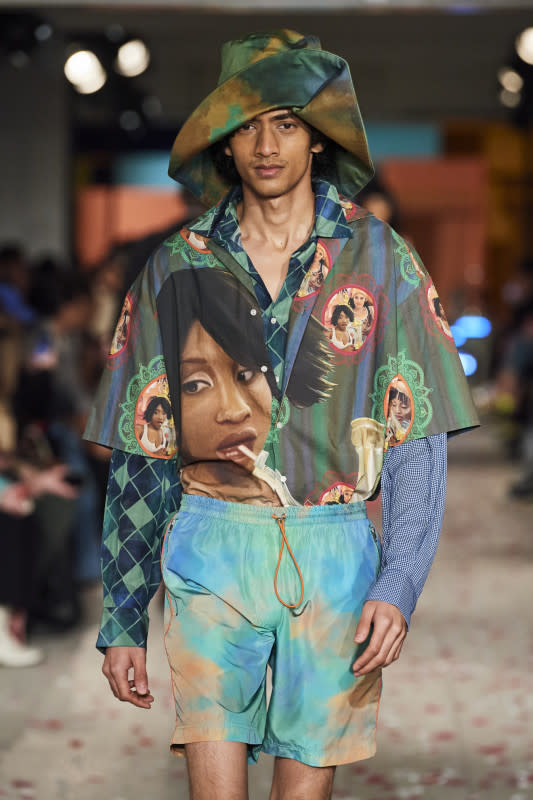
Photo: Launchmetrics Spotlight
What was your relationship with fashion like growing up?
I've always been really inspired by and emotionally connected to fashion. I've always found it almost otherworldly, like this performance world that I found really inspiring and intriguing. For as long as I can remember, I knew I wanted to be a designer and work in fashion. My mom is also really stylish, and I remember being very obsessed with looking through her wardrobe and reading all her magazines.
In 2018, you got an MA in menswear at the University of Westminster. Why did you get started in menswear, compared to taking the traditional womenswear route?
When I was doing my first degree, after one term, they encouraged people to try the other pathway. I tried womenswear at the beginning. When I did that swap, I actually found that I was really intrigued by menswear, because I think there's still so much to go and do with it. Men have been wearing the same thing for the past 50 years. It doesn't progress at the same speed as women's. There are boundaries that can be pushed there, but there are also these traditions to respect, like with tailoring and sportswear, that I found really interesting. I was very engaged with it. I found it motivating.
How do you feel your background and education helped you get to where you are right now?
There are two sides to it. First, my master's was incredibly significant in terms of me really discovering what I wanted to say and focus on as a creative and what values creatively matter to me. In a BA, it's almost like you set the foundation of your skills and learn all the different elements — you draw a lot, sew and pattern-cut, but you're encouraged to look at subjects outside of yourself, which I think is really good for opening up your mind. But with an MA, a lot of it is about self-discovery, what you're truly interested in and who you really want to be, creatively speaking. That was really instrumental in me being able to develop this pretty singular vision of what I want to do.
As for my background, my mom is super encouraging. She has been really supportive. She's a finance director and has drummed into me a business sense since I was a kid. I remember having quite grown-up conversations with her about business from a young age and also finding her massively inspiring as an Indian woman. She's in the construction industry, which, to be so senior in construction in the UK as an Indian woman is kind of unheard of. She naturally gave me this audacity to turn up into spaces that were not necessarily carved out for me previously. I also think my background culturally — I'm Indian-Nigerian and born in London — that melting pot that I live in and experience has massively led to what I want to do creatively.
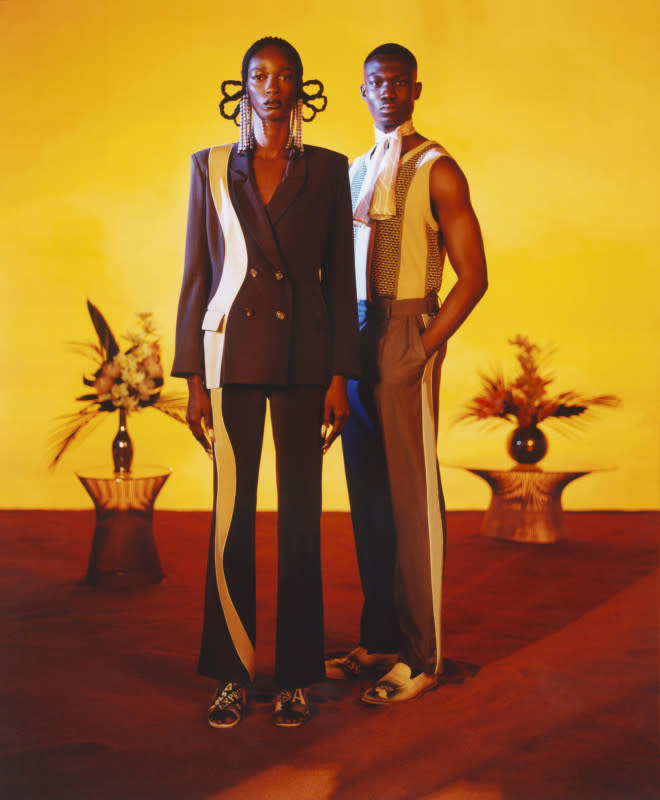
Photo: Launchmetrics Spotlight
How did you launch your brand?
For my MA, there was a graduate show. It was quite a horrible situation: There were 18 to 20 of us on the course, and 10 of us were selected for the final show.
At the same time, I was making a zine called 'Sweet Lassi,' which was basically a little book about my travels to Nigeria to see my dad. On that trip, I learned about the global secondhand clothing industry. I would see people wearing London Marathon T-shirts in Lagos, and I was so confused. I started asking questions and learned about a market where they resell Western secondhand clothing. I did more research and discovered Panipat in India, which is a global capital of recycling garments in the world. So, a few months later, I went to India. For both trips, I took my camera and documented everything I saw — I'm by no means a photographer, but I love using photography as a tool to document my research.
I made my final collection using vintage and repurposed clothing, and these material choices were inspired by these trips. The design was culturally directed by the travel as well. On the day of the graduate show, I released the zine and got so much press very quickly. It was featured in Dazed and i-D, and then, within weeks, on CNN. That quite clever and tactical idea on how to launch this project ended up leading to so many opportunities. Very quickly, I was approached by Opening Ceremony to make an order on my graduate collection. It happened quite naturally from there. I always knew I wanted to have my own brand, but I didn't necessarily know it would be then. But I knew I wanted to do it, and I'm really glad I did.
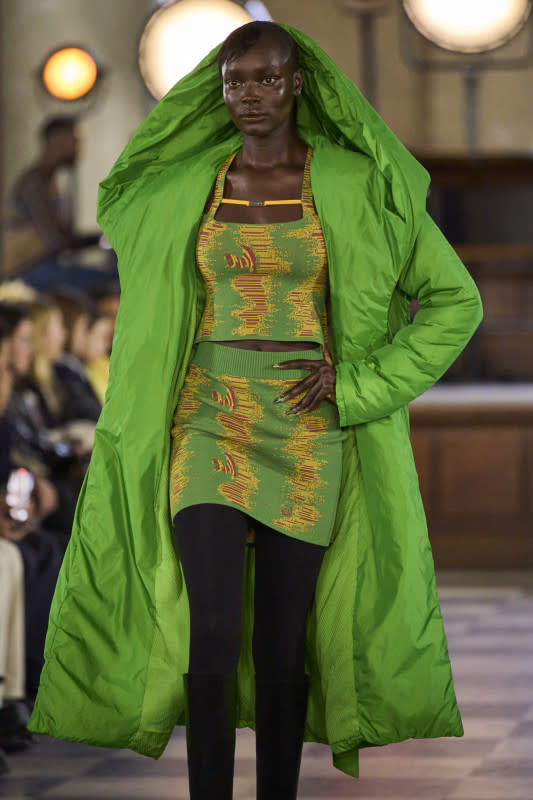
Photo: Launchmetrics Spotlight
How has that recognition further propelled and impacted your brand?
It obviously does so many things for visibility and grows your community, fan base and customers. But, also, it's quite validating as a creative. I don't do any of this for awards, but to have awards from people that you really respect, it's motivating. It allows you to feel audacious in situations where you might not normally feel so. And some of those prizes came with money, which is always great, because it's not easy being an independent brand in a recession.
On the topic of a recession, despite only being a two-year-old brand when the pandemic hit, you kept operations running. What shifts did you have to make to navigate that period?
It's really interesting because, at the time, I thought it was so hard. Now, I look back, and I've had much greater challenges than the pandemic. At that point, my team was tiny — it was just me and one other person — and my studio was still based at my mom's house. Really, it was a case of waiting it out, being agile in terms of the projects we were taking on and thinking more about the importance of the digital perception of the brand. The unknowing was scary, but I don't think it was actually that difficult because we were small. My overheads were pretty low — we did lose stockists, but, again, it was okay and we managed.
It was definitely a time when people wanted me to be, I guess, much more forward-facing as a part of the brand. I was doing a lot of projects that were based on me as an individual, rather than just the brand. It was an interesting time, but I also had amazing opportunities come up — I was approached by Gucci to be a part of Gucci Fest and then create my first film.
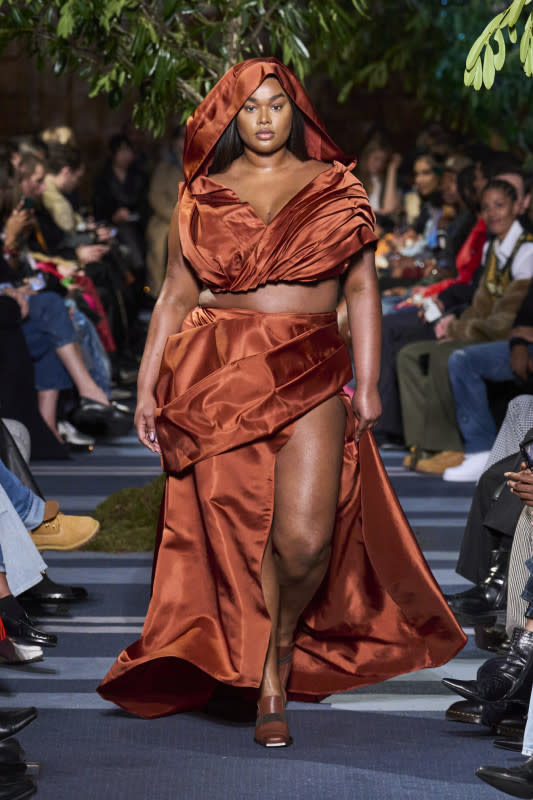
Photo: Launchmetrics Spotlight
How does this ethos of social and environmental responsibility translate into your designs?
It could be anything from material choices, like using vintage or deadstock, to where we work — so, working with social enterprises to make the garments — to the themes that we include in the prints. It could be the craftspeople we work with. It could be how I hire. I don't like the idea that the clothes look sustainable. There's nothing less sustainable than a garment that no one wants. I'm a designer first, and then I have the desire to make things in the best way possible.
It's a challenge. The logistics and production of fashion are not really set up to work in this way, so, a lot of the time, you're asking your suppliers and manufacturers to work in new territories. Because we're not like a Burberry or a brand with humongous volumes, it makes the price of everything go up. It's just constantly trying to train suppliers and reassure them that this is the right thing to do. But it definitely doesn't make it easy.
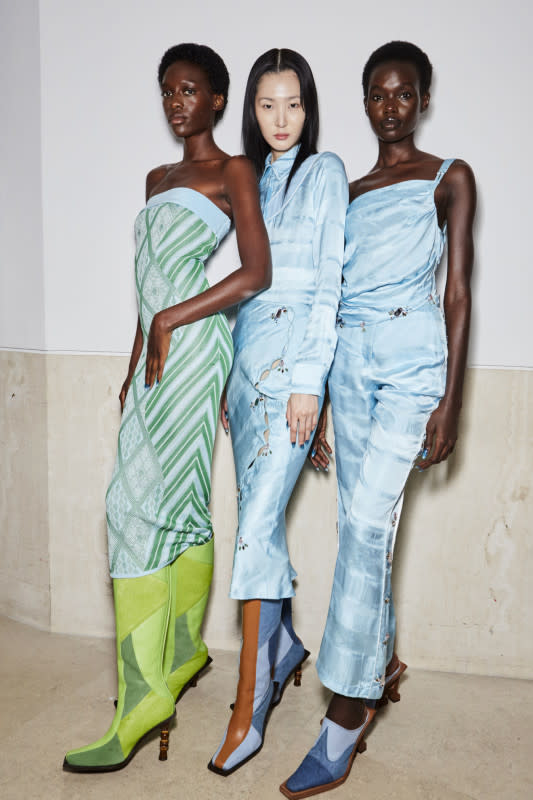
Photo: Launchmetrics Spotlight
Overall, what's been the biggest challenge you faced in running a brand?
Having to be the creative but also the CEO in one person can sometimes be overwhelming, because you have to spread yourself pretty thin. On a personal level, I've definitely had phases where I've not been looking after myself in the way that I should, and that doesn't have a great knock-on effect on my wellbeing.
Money is also hard for an emerging brand. I'm not someone who came from huge wealth. I think the way that the industry is set up cashflow-wise doesn't really work, so it's been about figuring out innovative solutions. But I would still choose to do this every single time.
Can you walk me through your retail strategy in terms of your goals and what's worked?
It's been really interesting because, right now, our biggest customer base is in the U.S. That's happened quite organically, and that's something I really feel quite proud of. We don't have an operation set up in the U.S. It's really nice to be supported over there.
Eventually, the goal would be to have my own stores. I would love to have Ahluwalia-owned stores that are not only stores but working spaces for us to hold events and invite the community in to do workshops. Community is sometimes used as a buzzword, but I really think it's important — it's something that I genuinely live by in my own life.
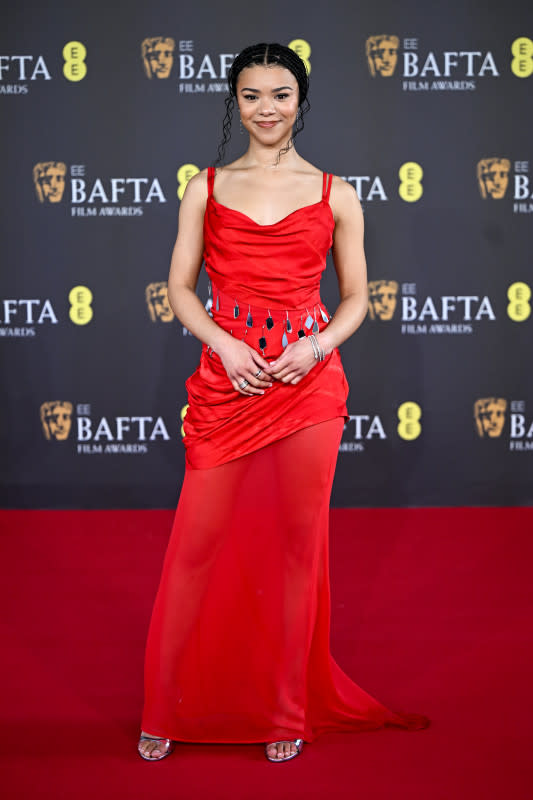
Photo: Stephane Cardinale-Corbis/Corbis via Getty Images
I'd love to pivot a little bit and talk about your celebrity moments — specifically, India Amarteifio wearing your brand at the 2024 BAFTAs. How did that come together?
I know India from just being at some nice parties in London. I've worked with her stylist, Holly White, a few times because she also styles Charithra Chandran, who's also in "Bridgerton." Holly asked us if we would be open to doing something for the BAFTAs and, of course, I said yes. So India and Holly came to the studio, and we worked through ideas. It was a really nice, easy process, and I loved doing it because I love "Queen Charlotte."
Looking back at your brand so far, what are the big milestones you see as the building blocks that got you to where you are today?
Some that are really important to me maybe in a more emotional way are definitely doing Gucci Fest and making my first film, "Joy," because then that led to me making more films and ultimately being signed as a film director with Ridley Scott's agency. That was an incredibly life-changing and really poignant moment for me.
Also, the day my collaboration with Mulberry was released, I also released the first-ever womenswear collection for Ahluwalia and won the GQ Menswear Fund. That Was bananas. That waS another good day. But there are loads of good days.
Where do you see your brand five to 10 years from now?
Hopefully having stores and also expand into home and lifestyle, like interiors. I would love to have furniture, candles, textiles for your home, glassware and lots of other stuff. I can picture what Ahluwalia's house would look like, and I'd love the opportunity to bring that to life one day.
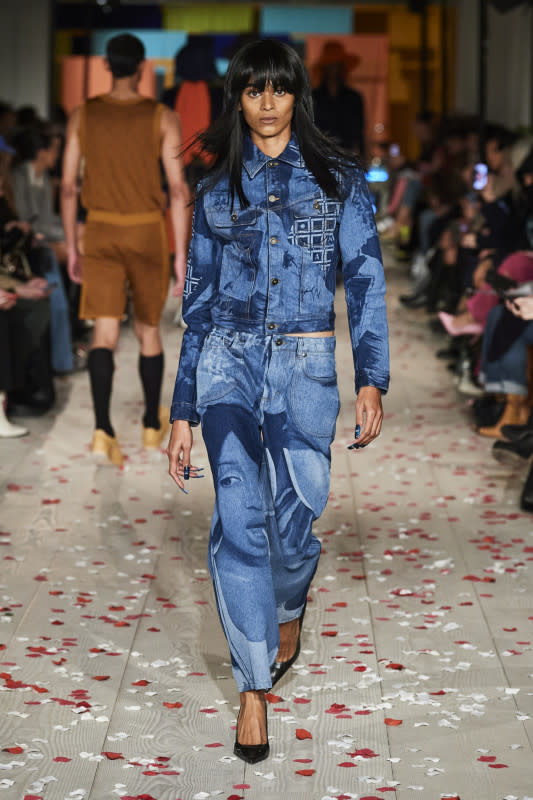
Photo: Launchmetrics Spotlight
What advice do you have for young designers today?
Learn your craft in all areas, especially if you want your own brand. Make sure you know how each aspect works before you start putting your money into stuff. Learn about how production works, how logistics works and all these different things. Try and make your mistakes on someone else's dollar.
Really think about what's authentically important to you and your vision, and what's your unique point of view. There are a lot of designers, a lot of brands and a lot of noise out there — if you don't have a unique point of view, it's difficult to stand out. Hone your craft, get a unique point of view and also think about the people you want to collaborate with, whether that's stylists, photographers, casting people or set designers. Having a creative community that you can lean on and support one another with is invaluable.
Times are quite hard at the moment globally, and it's difficult in creative jobs to not let it get you down and disillusioned. My advice for other people is, even though sometimes it feels really horrible and hard, the best and most innovative ideas come out of times of hardship. So, keep going and be kind to yourself.
Want the latest fashion industry news first? Sign up for our daily newsletter.

